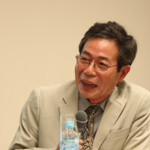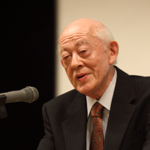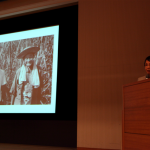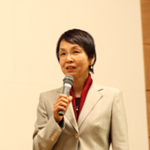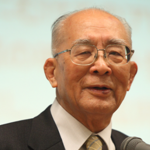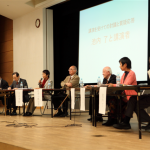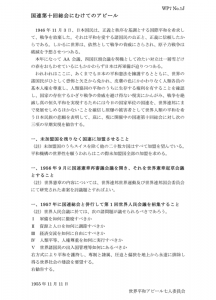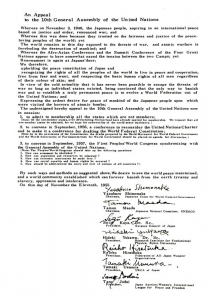April 24, 2017
The Committee of Seven to Appeal for World Peace
Kinhide Mushakoji, Hideo Tsuchiyama, Yoshino Oishi,
Michiji Konuma, Satoru Ikeuchi, Shin-ichiro Ikebe and Kaoru Takamura
In 2017, we, the citizens of Japan, celebrate the 70th Anniversary of the Constitution of Japan. This Constitution, in its Clause 19, guarantees the Rights to the freedom of thought and conscience of all citizens. We express our serious concern about the fact that a bill on the criminalization of conspiracy preparing crimes, a legislation violating this freedom, is presently under discussion in the Diet. This legislation endangers the basic principle of the legal system of Japan which limits criminalization to only already committed criminal acts. This attempt to change decisively the very base of the legal system of Japan has been repeatedly attempted by the Government since 2003, and has been rejected already three times by the Diet, after many revisions of the proposed text and continued deliberation crossing Diet sessions. The same legislation criminalizing conspiracy preparing criminal acts is again submitted to the Diet for the fourth time as a law criminalizing the preparation of terrorism and other criminal acts.
The Government explained the reason for this new legislation to criminalize “Conspiracy Preparing Criminal acts” as that it is a precondition to the ratification of the “United Nations Convention against Transnational Organized Crime” and this new legislation is indispensable in order to implement the legal measures to criminalize any activities implying the participation to a criminal act by two or more persons belonging to organized criminal organizations set out in the Clause 5 of this Convention.
The Abe Administration claims that unless the criminalization of conspiracy preparing Terrorism and other criminal acts is adopted by the Diet, Japan cannot ratify the above-mentioned United Nations Convention and hence cannot hold in 2020 the international Olympic and Paralympic Games. This statement is either based on misinterpretation of the international realities, or is a intentional distortion of the realities.
First, the “United Nations Convention against Transnational Organized Crime” states in its Clause 34 that Each State Party shall take the necessary measures, including legislative and administrative measures, in accordance with fundamental principles of its domestic law, to ensure the implementation of its obligations under this Convention.
The International Convention on the Elimination of All Forms of Racial Discrimination was ratified in Japan without any new legislations to implement. This is an example which contradicts the explanation of the Abe Administration.
Secondly, if the ratification of the United Nations Convention Against Transnational Organized Crime does not require any new legislation by the signatory parties, it is wrong to maintain the statement that the legislation criminalizing “the Preparation of Terrorism and other criminal Acts” must be adopted in order to ratify this United Nations Convention.
Thirdly, the objective of this Transnational Convention is not terrorism, and the proposed legislation also does neither have terrorism as its original objective. The Government has not presented to the Diet any justification to maintain that there exists an urgent need to create a law criminalizing the “Preparation of Terrorism and other criminal acts” in view of terrorist activities uncontrollable by the existing legal system.
Fourthly, the legal text which caused a public opposition does refer to 277 criminalized objects out of which 60% have entirely no relations to terrorism. The term “terrorism” was hastily added to the title and the explanation about why this law is submitted to the Diet legislation lacks any reference to terrorism.
From the above remarks, it follows logically, that the statement of the Government that without the legislation of “Crime of Preparation of Terrorism and other Criminal the Olympic Games cannot be held in Japan is entirely false. This way to try to accelerate the adoption of this law by deceiving the citizens cannot but alert us about the true intents behind this law.
First, to use the term “Counter Terrorism” to cover a variety of referents which cannot be limited to terrorism and make them the objects of an “important crime subject to more than four years’ penal servitude or incarceration” is logically manifesting an intent to use this crime to cover a variety of activities as undefined objects of this law.
Secondly, as it is assumed that even citizens living peacefully may become the object of investigation when they suddenly become members of criminal organizations, ordinary organizations of citizens may become the object of constant surveillance to determine whether sudden transformation does or does not take place.
Thirdly, any conspiracy is accompanied by preparatory acts. However, there is no concrete definition of what constitutes a preparatory act. Government replies to questions in the Diet declare that such acts do not have to be directly connected with the existence of a danger of criminal act. This cannot but mean that the definition of preparatory activities depends entirely on the judgement of the investigating authority. This, logically, makes the concept of “preparatory act” an entirely groundless legal argument.
Fourthly, the Government answers to questions in the Diet indicate that the investigating authorities are free to conduct their discretional investigations even before any activities preparing a crime has occurred, if the authorities judge that there exists a likelihood that a crime will be committed.
The logical consequences of the above trends are that all citizens will become the targets of a constant ever-broadening legal surveillance of their everyday life, and the object of legalized surveillance lacking any objective justification. So far as punishable criminality covers not only actual acts but also conspiracy and joint planning, we will be forced to accept any demand by the authorities to be submitted to questioning, in their discretionary investigating authorities so decide.
Since terrorists and criminal organizations cannot be distinguished by their appearance from peaceful citizens like all of us, all citizens become objects of surveillance to find conspiring criminals. Consequently, it is impossible to stop the expanding range of investigations using wiretapping and GPS.
The true reason the Government wants to have the Diet accept this legislation is clearly not to cope with terrorism but rather to develop a broad network of surveillance enabling the Government authorities to cover all aspects of the citizens’ livelihood. We strongly oppose this legislation which violates all the rights of the citizens of Japan about the freedom of thought and conscience, guaranteed by the Constitution, under the pretext of preventing the preparation for terrorism and other criminal acts.
PDF Appeal→![]() 124e.pdf
124e.pdf

